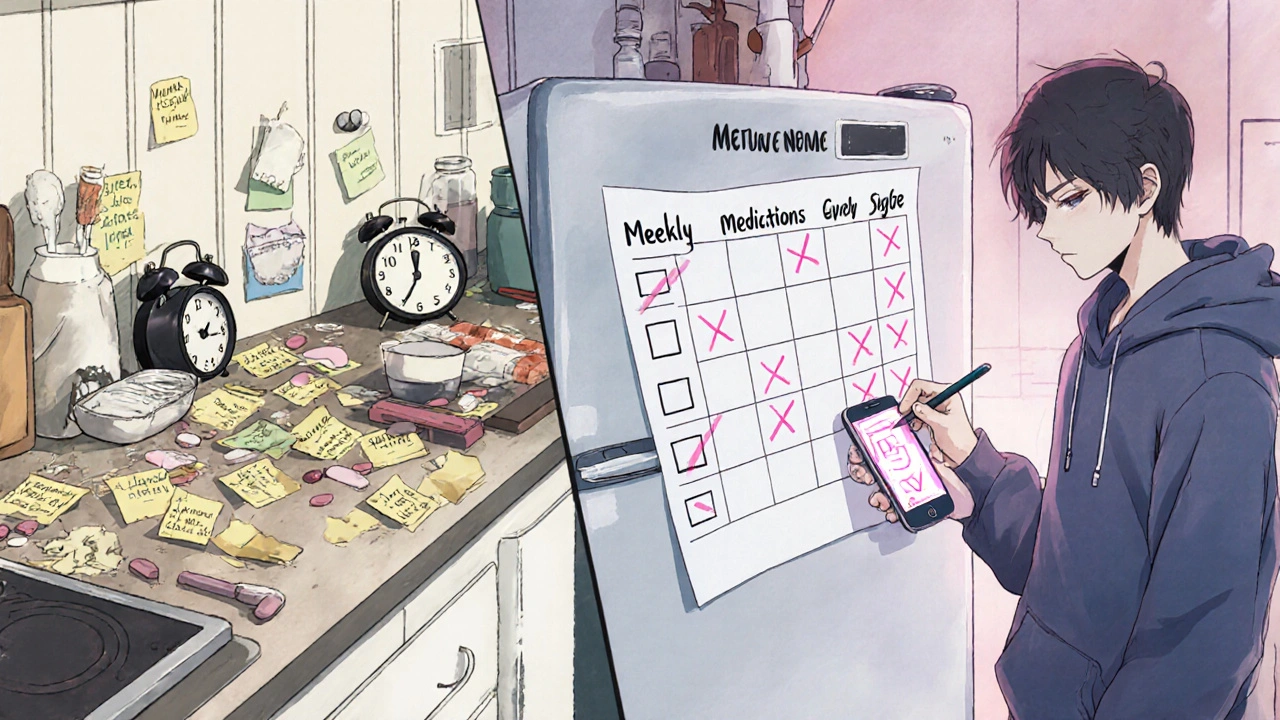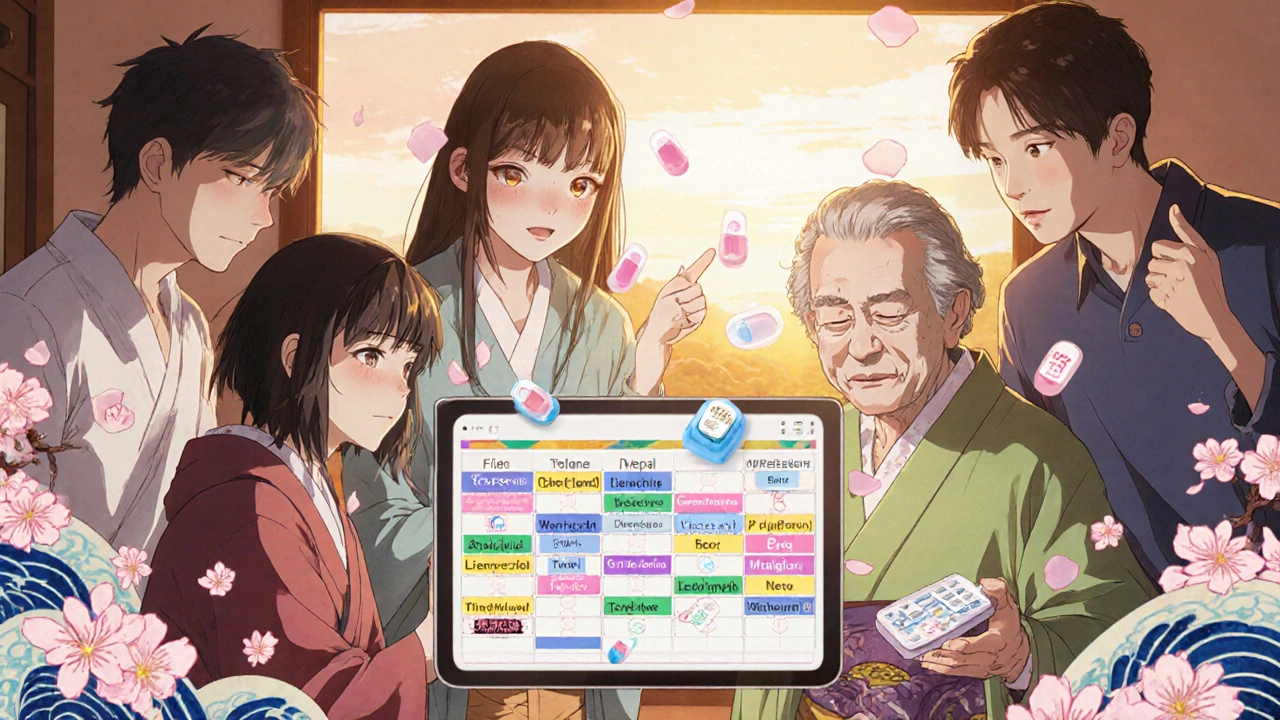Medication Interaction Checker
Check if medications you're taking might have dangerous interactions. This tool identifies common dangerous combinations based on medical guidelines. Always consult your doctor or pharmacist for medical advice.
Enter two medications to check for dangerous interactions.
Why a Shared Medication Calendar Matters
Imagine your parent takes seven different pills a day-some with food, some on an empty stomach, others at bedtime. One dose is missed. A week later, they end up in the ER because of a bad interaction between two medications nobody knew were conflicting. This isn’t rare. Nearly 125,000 people die every year in the U.S. from medication errors, and most of them happen because no one was keeping track together. A shared medication calendar fixes this. It’s not just a reminder app. It’s a safety net that pulls your whole family and caregivers into one clear system.
Most families try to manage this with sticky notes, phone calls, or memory. That doesn’t work. People forget. Time zones get mixed up. Someone starts a new medication and doesn’t tell anyone. A shared calendar changes that. It gives everyone the same information, at the same time, with alerts that actually reach the right people.
What a Shared Medication Calendar Does
A shared medication calendar isn’t your regular Google Calendar with a few extra events. It’s built to handle the complexity of real medication routines. It tracks:
- Exact medication names and dosages
- Timing-when to take each pill, including if it’s before, with, or after meals
- Refill dates and pharmacy details
- Side effects to watch for
- Doctor appointments tied to prescriptions
- Who’s responsible for each task-picking up pills, setting alarms, checking if it was taken
When someone misses a dose, everyone gets notified-not just the main caregiver. If a new drug is added, it shows up instantly for all users. This cuts down on dangerous overlaps. For example, mixing blood thinners with certain painkillers can cause internal bleeding. A good system flags that before it’s even entered.
Choosing the Right Tool: General Calendars vs. Healthcare Apps
You can use any calendar app, but not all are made for this job.
Google Calendar is free and works on any device. You can share it with as many people as you want. But it has no idea what a medication is. You type in "Lisinopril 10mg AM" and that’s it. No warnings if someone adds another drug that interacts with it. It’s useful if you’re tech-savvy and willing to manually track everything. But it won’t stop a mistake.
Apple Calendar works beautifully if everyone uses iPhones. It syncs with the Health app and lets you set reminders with Siri. But if your sibling uses an Android phone? They’re locked out. That’s a problem when half your family isn’t on Apple.
Specialized apps like Medisafe, Caily, and CareZone are built for this. They know about drug interactions-Medisafe checks over 650,000 combinations. They let you assign tasks: "Mom needs groceries on Tuesday," "John picks up prescription Friday." They send alerts to multiple people at once. And they store data securely, following HIPAA rules.
Here’s how they compare:
| Tool | Cost | Drug Interaction Alerts | Multi-User Access | Pharmacy Integration | Task Assignment |
|---|---|---|---|---|---|
| Google Calendar | Free | No | Yes | No | No |
| Apple Calendar | Free | No | Yes (iOS only) | No | No |
| Medisafe | Free basic, $9.99/month premium | Yes (650,000+ combos) | Yes (premium) | No | Basic |
| Caily | Free basic, $9.99/month premium | Yes | Yes (up to 15 people) | No | Yes (tasks, chores, rides) |
| CareZone | Free basic, $5.99/month premium | Yes | Yes | Yes (auto-imports prescriptions) | Yes |
For most families, a specialized app is worth the cost. If your loved one takes more than three medications daily, or if you have multiple caregivers spread across cities, don’t risk it with a generic tool.

Setting Up Your Shared Calendar: A Step-by-Step Guide
Don’t just download an app and hope it works. Setup matters. Here’s how to do it right:
- Hold a family meeting-within 48 hours of starting. Everyone who helps with care needs to be there. Even if they live far away. Use Zoom if needed. Talk about who will be responsible for what.
- Choose your tool-based on who’s involved. If most are on iPhone, Apple Calendar might work. If there’s a mix, go with Medisafe or Caily. If someone manages prescriptions at the pharmacy, CareZone’s import feature saves hours.
- Create a separate calendar-don’t mix meds with birthdays and vacations. Name it clearly: "Mom’s Medications - Shared." This keeps things clean and private.
- Enter every medication-use the exact name, dose, and timing. Don’t say "blood pressure pill." Say "Lisinopril 10mg, take daily at 8 AM with breakfast." Include instructions like "avoid grapefruit" or "take on empty stomach."
- Set reminders 15 minutes early-people need time to get water, sit down, or find the pillbox. A reminder at 8:00 AM for an 8:15 AM dose gives breathing room.
- Add refill alerts-set a reminder for when prescriptions run out. Link to the pharmacy if your app allows it.
- Assign roles-who checks if pills were taken? Who calls the pharmacy? Who updates the calendar when the doctor changes something? Write it down.
- Share access-invite everyone by email. Make sure they accept the invitation. Test it: send a fake reminder and see who gets it.
After setup, do a weekly 10-minute check-in. See if anyone missed a dose. Did a reminder fail? Is someone overwhelmed? Fix it fast.
Privacy and Trust: The Hidden Challenge
Here’s the uncomfortable truth: many older adults don’t want their kids seeing every detail of their health. They fear losing control. That’s valid.
68% of seniors worry about family members having full access to their medical info, according to the National Council on Aging. So don’t force it. Start small. Share only what’s necessary. Use apps that let you control who sees what. For example, CareZone lets you give one person access to meds but not to emergency contacts. Caily lets you hide certain notes from certain users.
Also, don’t assume tech-savvy means willing. Some older adults hate apps. If your parent doesn’t use smartphones, don’t expect them to manage the calendar. Design it for the caregivers, not the patient. Print out a weekly schedule and leave it on the fridge. Use a pill organizer with alarms. Let the app be the tool for the people doing the work-not the person being cared for.

What Happens When It Fails
Technology isn’t perfect. People turn off notifications. Phones die. Apps glitch. That’s why you need a backup.
41% of users report ignoring reminders because they’re too frequent or annoying. 28% get confused by time zones when family lives across the country. 23% of errors happen because someone saw a reminder but didn’t act-false confidence.
Solutions:
- Use physical backups: a printed weekly chart taped to the bathroom mirror.
- Set up a text chain: "Did you give Mom her 2 PM pill?" "Yes, done." Simple.
- Train everyone to double-check. If two people confirm a dose was taken, it’s more likely to be true.
- Don’t rely on AI predictions. Medisafe can guess if someone might miss a dose-but it’s not a crystal ball. Human verification still matters.
And if someone refuses to join? Don’t give up. Ask why. Maybe they’re overwhelmed. Maybe they don’t trust the app. Maybe they feel like they’re being monitored. Listen. Adjust. Sometimes, just one person using the calendar correctly can still prevent disaster.
Real Results: What Works
Studies show that when families use a proper shared medication calendar:
- Missed doses drop by 47%
- Emergency room visits for medication errors fall by up to 31%
- Primary caregivers report less burnout-especially when tasks are shared
- Drug interactions are caught before they happen
Kaiser Permanente saw a 31% drop in ER visits after giving CareZone to 2.1 million patients. That’s not luck. That’s coordination.
One family in Bristol shared a Caily calendar for their 82-year-old mother with dementia. She took 11 medications. Before, her daughter missed a dose every other week. After setup, with alerts going to her brother in Scotland and her sister-in-law in London, missed doses dropped to zero in six months. The daughter said: "I finally slept through the night. I didn’t realize how much I was worrying."
What’s Next for Medication Calendars
Things are getting better. Apple’s iOS 17 can now pull prescription info directly from your doctor’s system into the Health and Calendar apps. Medisafe uses AI to predict when someone is likely to skip a pill based on past behavior. In 2024, Caily plans to connect directly with pharmacy benefit managers so refills auto-request.
By 2027, most healthcare systems will offer built-in medication calendars. But for now, you don’t need to wait. The tools are here. The data is clear. The risk of doing nothing is too high.
You don’t need to be a tech expert. You don’t need to do everything alone. Just start. Pick one app. Add one medication. Invite one person. That’s enough to begin changing the outcome.
Can I use Google Calendar for a shared medication schedule?
Yes, but only if you’re okay with manual entry and no drug interaction warnings. Google Calendar is free and works across devices, but it won’t alert you if two medications clash. It’s fine for simple routines with one or two pills, but not for complex regimens. For safety, use a healthcare-specific app like Medisafe or CareZone.
What if my family members don’t use smartphones?
You don’t need everyone to use the app. Design the system for the people who are doing the work. If your brother checks pills every morning, he needs the app. If your cousin only helps once a month, give them a printed schedule. Many families keep a physical copy on the fridge as a backup. The app is a tool for coordination, not a requirement for everyone.
Is it safe to share health info through these apps?
Only use apps that are HIPAA-compliant if you’re storing medication names, doses, or medical conditions. Medisafe, CareZone, and Caily meet this standard. Google and Apple calendars do not. They’re not designed for health data. If you’re unsure, check the app’s privacy policy. Look for "HIPAA compliant" or "encrypted health data." Avoid free apps that don’t say this clearly.
How do I handle time zones when family lives far away?
Set the calendar to the patient’s local time zone. Most apps do this automatically. Then, make sure everyone’s device is set to update time zones correctly. Use reminders like "Take pill at 8 AM Eastern Time" instead of "8 AM" alone. If someone is in a different zone, they’ll see the reminder adjusted to their local time-but the event still happens at the right moment for the patient.
What if my loved one refuses to let me set up a shared calendar?
Respect their autonomy. Start by asking what they’re worried about. Maybe they fear losing independence. Offer to set it up without sharing access-just for your own tracking. Then show them how it helps you help them. Sometimes, letting them control who sees what (like hiding notes from certain people) builds trust. If they still say no, use a printed calendar and check in daily. Safety doesn’t always require tech.
Are there free options that work well?
Yes. Medisafe and Caily offer free versions with basic multi-user sharing. CareZone’s free plan includes pharmacy import and task lists. Google and Apple calendars are free too, but lack safety features. For simple needs, free apps can work. But if someone takes more than three medications daily, the premium versions (usually under $10/month) are worth the cost for the alerts, interaction checks, and reliability.

Joseph Peel
November 17, 2025 AT 08:51Using Google Calendar for medication tracking is like using a spoon to dig a trench-technically possible, but wildly inefficient. The lack of drug interaction alerts, refill tracking, and role assignment makes it a liability, not a tool. For anyone managing more than two medications, the risk isn’t worth the free price tag. Specialized apps aren’t a luxury; they’re a clinical necessity.
Kelsey Robertson
November 18, 2025 AT 21:05Joseph Townsend
November 19, 2025 AT 03:57Let me tell you something-this whole shared calendar thing? It’s the modern-day version of a family heirloom that nobody wants but nobody dares throw out. I’ve seen it happen: the app gets set up, everyone promises to check it, then-poof-it becomes a ghost town. Notifications ignored, reminders silenced, roles forgotten. And then, when the crisis hits? Everyone’s like, 'Wait, I thought *you* were handling it!' This isn’t tech failure-it’s human failure. We want control without responsibility. The app doesn’t fix that. It just makes the silence louder.
Bill Machi
November 19, 2025 AT 20:21Elia DOnald Maluleke
November 21, 2025 AT 06:32It is not merely a matter of technological adoption, but of epistemological humility. The Western obsession with quantifying care through digital interfaces betrays a profound misunderstanding of the human condition. One cannot algorithmically encode the tenderness required to hold a trembling hand while administering medication. The app may track doses, but it cannot witness the tear in the eye of the daughter who fears she is losing her mother twice-once to illness, and again to the cold logic of a calendar.
satya pradeep
November 22, 2025 AT 20:09Prem Hungry
November 23, 2025 AT 03:45Respectfully, the most important component of any shared medication system is not the software, but the sacred covenant of presence. Technology is merely the vessel. The real power lies in the daily check-in, the cup of tea offered alongside the pill, the quiet assurance that someone sees you, even when the app is silent. I have seen families who use no app at all, yet maintain perfect adherence through ritual, eye contact, and the unspoken language of love. Do not mistake efficiency for compassion.
Leslie Douglas-Churchwell
November 23, 2025 AT 05:45shubham seth
November 23, 2025 AT 15:59Kathryn Ware
November 23, 2025 AT 18:07I just want to say thank you for writing this-I’ve been doing this for my mom for 3 years and I cried reading your section on privacy. My mom refused to use any app at first, so I set it up on my phone and printed a weekly sheet for her fridge. Then one day, she saw the refill alert I’d set and said, 'You didn’t have to do all this...' and hugged me. That’s when I realized-it’s not about the tech. It’s about showing up. I use CareZone free version, add meds manually, and have my sister and cousin on it. We do a quick text every night: 'Pill check done.' Simple. No drama. Just love with a little help from tech. And yes, I use emojis. 🌸💊❤️